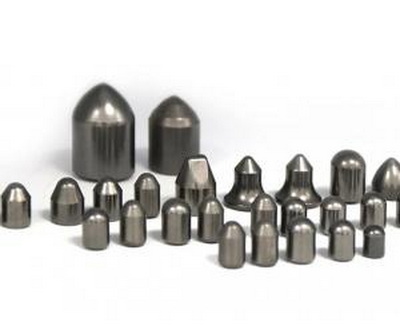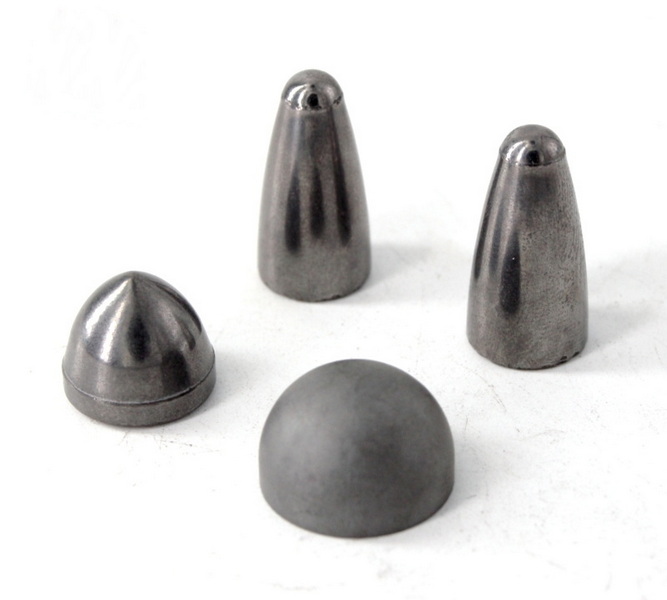Content Menu
● The Science Behind Tungsten Carbide
● CG Carbide's Production Process
● Mining Applications Enhanced by CG Carbide
>> 1. Drill Bits and Inserts
>> 2. Roadheader Picks
>> 3. Crushing and Grinding Equipment
>> 4. Conveyor Systems
● Case Study: CG Carbide in Chilean Copper Mines
● Sustainability and Environmental Impact
● Future Developments and Innovations
● Industry Partnerships and Collaborations
● Conclusion
● FAQ: CG Carbide in Mining Tools
>> 1. Why choose CG Carbide over standard tungsten carbide?
>> 2. How does sintering temperature affect tool performance?
>> 3. Can CG Carbide tools be reconditioned?
>> 4. What ROI can mines expect with CG Carbide tools?
>> 5. Does CG Carbide support sustainable mining?
● Citations:
Tungsten carbide has revolutionized mining operations by offering unparalleled hardness, wear resistance, and durability. CG Carbide Production leverages advanced manufacturing techniques to create carbide components that outperform traditional materials, ensuring longer tool life, reduced downtime, and higher productivity in harsh mining environments. This article explores how CG Carbide's proprietary methods elevate mining tool performance while addressing key industry challenges.

The Science Behind Tungsten Carbide
Tungsten carbide (WC) is a composite material combining tungsten particles with a metallic binder, typically cobalt or nickel. Its molecular structure grants exceptional properties:
- Hardness: Second only to diamond on the Mohs scale, enabling it to cut through abrasive rock formations.
- Heat Resistance: Maintains structural integrity at temperatures exceeding 600°C, critical for high-speed drilling.
- Wear Resistance: Outlasts steel tools by 50–100x in abrasive conditions, reducing replacement frequency.
CG Carbide optimizes these traits through precise control of grain size (5–70 µm) and carbon content (6.13 ±0.05%). Narrow grain distributions minimize micro-cracks, while high-temperature carburization enhances surface hardness.
Close-up of tungsten carbide grains under electron microscopy, showcasing uniform particle distribution CG Carbide's tightly controlled grain structure ensures consistent performance.
CG Carbide's Production Process
CG Carbide employs a vertically integrated powder metallurgy process to ensure quality at every stage:
1. Powder Synthesis:
- Tungsten oxide is reduced to pure tungsten powder, then carburized with carbon at 1,400–1,600°C to form WC.
- Cobalt binder (6–12%) is added to enhance toughness.
2. Compaction:
- Powders are pressed into near-net shapes using isostatic or die pressing, achieving densities >60%.
3. Sintering:
- Parts are heated to 1,300–1,500°C in vacuum furnaces, eliminating porosity and bonding grains.
4. Post-Processing:
- Grinding, EDM, and coating (e.g., TiN) refine dimensions and surface properties.
This process yields grades like MAS 500–7000, tailored for specific mining applications. For instance, MAS 7000 (70 µm grains) resists impact in percussive drilling, while MAS 500 (5 µm) excels in precision cutting.
Infographic of CG Carbide's production workflow CG Carbide's end-to-end control minimizes defects and maximizes tool lifespan.

Mining Applications Enhanced by CG Carbide
1. Drill Bits and Inserts
CG Carbide's tungsten carbide inserts for rotary drills withstand extreme axial loads and thermal shock. In coal mining, their button bits reduce wear by 40% compared to steel alternatives.
2. Roadheader Picks
Reinforced with MAS 2000-grade carbide, these picks maintain sharpness in tunnel-boring machines, cutting through granite at 2x the speed of conventional tools.
3. Crushing and Grinding Equipment
Cemented carbide liners in crushers and mills endure 500+ hours of ore processing without significant wear, slashing maintenance costs by 30%.
4. Conveyor Systems
Carbide-tipped scraper blades clear abrasive debris from belts, reducing downtime by 25% in iron ore mines.
CG Carbide drill bits in action at a copper mine Field tests show CG Carbide tools last 3x longer in hard-rock drilling.
Case Study: CG Carbide in Chilean Copper Mines
A major Chilean copper operator switched to CG Carbide's MAS 3000-5000 series for blast-hole drilling:
- Tool Life: Increased from 800m to 2,400m per bit.
- Cost Savings: Reduced bit replacement costs by 62%, saving $1.2M annually.
- Productivity: Drilling rates improved by 18% due to consistent performance.
Sustainability and Environmental Impact
CG Carbide's commitment to sustainability is evident in its closed-loop recycling program. By recovering 95% of tungsten from used tools, CG reduces CO₂ emissions by 40% per ton processed. This not only supports environmentally responsible mining practices but also conserves critical resources. Additionally, CG's tools help mines transition towards more efficient operations, reducing energy consumption and waste generation.
Future Developments and Innovations
CG Carbide continues to innovate, exploring new carbide grades and manufacturing techniques to address emerging challenges in mining. For example, the development of MAS 9000—a high-impact grade for extreme drilling conditions—is underway. This grade promises even greater durability and resistance to thermal shock, further enhancing tool lifespan in deep mining applications. Moreover, CG is investing in advanced coatings and surface treatments to improve tool performance in high-wear environments.
Industry Partnerships and Collaborations
CG Carbide fosters strong partnerships with leading mining equipment manufacturers and research institutions. These collaborations facilitate the development of customized tool solutions tailored to specific mining conditions and challenges. By working closely with industry experts, CG ensures its products meet the evolving needs of the mining sector, driving technological advancements and operational efficiencies.
Conclusion
CG Carbide Production transforms mining efficiency through advanced material engineering. By refining tungsten carbide's microstructure and manufacturing processes, CG delivers tools that withstand extreme conditions while lowering operational costs. As mines push into deeper, harder deposits, CG's innovations provide the durability and precision needed to meet tomorrow's challenges. The integration of sustainability practices and ongoing R&D ensures CG remains at the forefront of the mining industry, supporting both economic growth and environmental stewardship.

FAQ: CG Carbide in Mining Tools
1. Why choose CG Carbide over standard tungsten carbide?
CG Carbide's proprietary MAS grades offer narrower grain distributions and optimized binder ratios, enhancing both hardness and fracture resistance.
2. How does sintering temperature affect tool performance?
CG Carbide uses precise sintering profiles (1,450°C ±10°C) to eliminate cobalt pooling, ensuring uniform toughness.
3. Can CG Carbide tools be reconditioned?
Yes. Worn inserts are recycled through CG's recoating service, restoring 85% of original performance at 30% cost.
4. What ROI can mines expect with CG Carbide tools?
Operators typically see a 200–300% ROI within 12 months via reduced replacements and downtime.
5. Does CG Carbide support sustainable mining?
CG's closed-loop recycling recovers 95% of tungsten from used tools, cutting CO₂ emissions by 40% per ton.
Citations:
[1] https://www.hcstarck.com/wp-content/uploads/2020/08/Tungsten-Carbide-MAS-Mining-Application-Special_PD-1401.pdf
[2] https://techcarbide.com/en-gb/mining_inserts_eng/
[3] https://carbideprovider.com/carbide-for-mining-tools-20241226/
[4] https://pistentool.fr/what-is-tungsten-carbide-and-its-applications/
[5] https://www.azom.com/article.aspx?ArticleID=18084
[6] https://www.istockphoto.com/photos/carbide-tools
[7] https://generalcarbide.com
[8] https://cgmaterial.com/products/tungsten-carbide-powder-wc
[9] https://www.retopz.com/industries/mining-industry-carbide/
[10] https://www.linkedin.com/pulse/significance-tungsten-carbide-buttons-mining-shijin-lei
[11] https://pdf.directindustry.com/pdf/elementsix/mining-tools/59064-763069.html
[12] https://www.basiccarbide.com/mining-industry-carbide/
[13] https://www.tandfonline.com/doi/full/10.1080/09593330.2024.2447962?src=
[14] https://www.sourcifychina.com/carbide-mining-tools-guide-in-depth/
[15] https://www.linkedin.com/pulse/carbide-production-environmental-impact-bd-drill-brade-54xec
[16] https://www.mitsubishicarbide.net/webcatalog/OMB04F001BLogic.do;jsessionid=C94AAF5A8CE20DAD4A9162A788A2696E?srs_id=10000137&gng_rykshu=enuk&ctgr_rykshu=solid_end_mills&ngs_tni=M&hskzi_ini=&inst_ybkgu=&inst_zish_mi=&row=20&startIndex=0
[17] https://www.shutterstock.com/search/carbide-lamp
[18] https://www.ceramicsrefractories.saint-gobain.com/materials/silicon-carbide-sic
[19] https://www.youtube.com/watch?v=r36do6tOZZU
[20] https://www3.epa.gov/ttnchie1/ap42/ch11/final/c11s04.pdf
[21] https://www.youtube.com/watch?v=zJkVi0cmtX0
[22] https://www.hydrocarbide.com/products/compacts-drilling-mining/
[23] https://www.hannibalcarbide.com/technical-support/about-carbide/
[24] https://quickgrind.com/the-benefits-of-solid-carbide-tooling-for-manufacturing/
[25] https://pmc.ncbi.nlm.nih.gov/articles/PMC7142786/
[26] https://byjus.com/chemistry/calcium-carbide/
[27] https://publications.iarc.fr/_publications/media/download/4509/b6b1358aeb7600b61701c4af20672335d2fb8f4f.pdf
[28] https://www.alamy.com/stock-photo/calcium-carbide.html
[29] https://www.nature.com/articles/s41598-023-38436-8
















